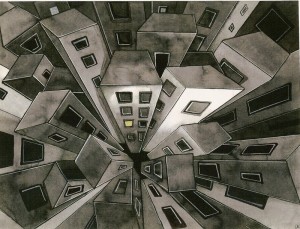 After having just finished Capital (Vol. I), Henri Lefebvre’s The Production of Space makes so much more sense than the first time a read it. (Though hugely insightful, it’s still a total slog to read.) The reasons behind my understanding it better via Capital are many, but most basically it comes down to Lefebvre’s proposition that space, like commodities, both embodies and conceals social relations. Building from Marx’s account of commodities, Lefebvre shows how space is a “concrete-abstraction.” It involves mental constructions and abstractions, it also entails a material physicality, and these only gain concreteness through and in human practice—space, like capital, is fundamentally a social process. Marx’s notion of “fetish” is an integral part to Lefebvre’s entire project. In many ways, he wants to do with space what Marx accomplished viz. commodities and exchange; and do to philosophico-scientific thinking on space what Marx did viz. political economy.
After having just finished Capital (Vol. I), Henri Lefebvre’s The Production of Space makes so much more sense than the first time a read it. (Though hugely insightful, it’s still a total slog to read.) The reasons behind my understanding it better via Capital are many, but most basically it comes down to Lefebvre’s proposition that space, like commodities, both embodies and conceals social relations. Building from Marx’s account of commodities, Lefebvre shows how space is a “concrete-abstraction.” It involves mental constructions and abstractions, it also entails a material physicality, and these only gain concreteness through and in human practice—space, like capital, is fundamentally a social process. Marx’s notion of “fetish” is an integral part to Lefebvre’s entire project. In many ways, he wants to do with space what Marx accomplished viz. commodities and exchange; and do to philosophico-scientific thinking on space what Marx did viz. political economy.
The first sections of the book deal mostly with how this fetish and misapprehension of space has worked in philosophy—most exemplary via the dualism of subject/object. Lefebvre goes through a litany of philosophical sources to make the point that a proper “unitary theory” of space as a social product must incorporate three moments: the perceived (physicality), the conceived (ideality), and the lived (experiential), which subsumes the former two. Taking any one of these elements in isolation of their dialectical totality only further mystifies and naturalizes space, as it appears to us. This violent abstraction, which goes on in philosophical discussion as much as it does in our own everyday life, is an inherent aspect of how power is exercised in and through space. Indeed, it is through such abstractions that power achieves its concreteness in the production of space. When space appears to us as a simple matter-of-fact—in much the same way as we might uncritically view commodities—we are not thinking of space as something produced within ensemble of social relations. Lefebvre’s clearest discussion of this fetish is on pages 80-85 (pp. 113, 340-342 are also good on this, too).
Elsewhere, he writes: “The space of a (social) order is hidden in the order of space…. How is this possible? How could such capabilities, such efficacy, such ‘reality’ lie hidden within abstraction? To this pressing question here is an answer whose truth has yet to be demonstrated: there is a violence intrinsic to abstraction, and to abstraction’s practical (social) use” (289). The production of space and spatial fetishism is entirely bound up with the development of capitalism: “The fetishism of an abstract economics is being transformed into the fetishism of an abstract economic space. Space-become-commodity [e.g. lots of property, a tourist Riviera] develops the traits of commodities in space to the maximum” (351). He makes the same points in terms of the state itself, which he sees as another concrete-abstraction that achieves social reality in space.
Without this critical apparatus we’re bound to see, say the layout of a city with gleaming luxury towers and teeming slums as some kind of quasi-natural occurrence of city life in general, rather than as a product of concrete political, economic, and social forces and relations. Otherwise we’d be complicit in promoting “the spread of some particularly mystifying notions, and especially the idea that the modern city is a product not of the capitalist or neocapitalist system but rather of some putative ‘sickness’ of society” (99).
Lefebvre references Gramsci in the early pages of the book and acknowledges the role of hegemony in the production of space. Although hegemony is underplayed and not explicitly referenced in much of the book, I think the concept-fact of hegemony is indispensible to the production of space, as Lefebvre is theorizing it. I think hegemony helps think through the paradoxical opaqueness/transparency of space: common sense “understands” space, yet in the process a host of other relations are simultaneously obscured, particularly considering the role that Lefebvre assigns to economic relations and the state.
Against this bind of the spatial fetish, Lefebvre proposes the following moments for understanding space as socially produced: spatial practice, representation of space, representational spaces—these correspond to the perceived, conceived and lived dimensions of space noted earlier (respectively, mental, ideal, and everyday life). Lefebvre says that to do this he will employ the methods outlined in the Grundrisse, which will be working from the present to the past, in order to understand the genesis of the present, and then retracing his steps back to the present. In the process, he wants to reconstruct how the “production of space” illuminates and validates its own “coming-into-being” as a “theoretical concept and practical activity in indissoluble conjunction” (67). Form (perceived), structure (conceived), function (experienced) are another triad set that corresponds to Lefebvre’s other conceptual triads. But “each time one of these categories is employed independently of the others, hence reductively, it serves some homogenizing strategy” (369).
“A theory is therefore called for, one which would transcend representational space on the one hand and representations of space on the other, and which would be able properly to articulate contradictions (and in the first place the contradiction between two aspects of representation). Socio-political contradictions are realized spatially. The contradictions of space thus make the contradictions ‘express’ conflicts between socio-political interests and forces; it is only in space that such conflicts come effectively into play, and in so doing they become contradictions of space” (365). One thing that wasn’t clear to me is what or how these contradictions arise? Is it some kind of non-correspondence between them? Something realized or induced by a critical pedagogy? Or what?
But this isn’t an abstract mode, Lefebvre says we must employ it with an intense historicism: “What we are concerned with, then, is the long history of space, even though space is neither a ‘subject’ or an ‘object’ but rather a social reality – that is to say, a set of relations and forms” (116). And my favorite quote: “Space is a social morphology: it is to lived experience what form itself is to the living organism, and just as intimately bound up with function and structure” (94).
From 275 to 282, he has some good material on the state, drawing from Hegel and Marx; this discussion also includes violence and capital.
I’m out of steam after reading this way too difficult book, but it might be worth revisiting the section on differential space in another post, particularly with subaltern movements of territorialization.


Pingback: Lefebvre, Fetish, Critique | Territorial Masquerades
Pingback: Thoughts on Soja's Postmodern Geographies | Territorial Masquerades
Pingback: Lefebvre: State, Space, World | Territorial Masquerades
Pingback: Spatiality and Power | Territorial Masquerades
As you know most of the communities (such as Bengali) in this sub-continent(Indian) are covered by ‘Culture of Poverty’ (Oscar Lewis), irrespective of class or economic strata, lives in pavement or apartment. Nobody seriously condemn or ashamed of the deep-rooted corruption, decaying general quality of life, worst Politico-governance, bad work place, weak mother language, continuous consumption of common social space (mental as well as physical, both). We are becoming fathers & mothers only by self-procreation, mindlessly & blindfold(supported by some lame excuses). Simply depriving their(the children) fundamental rights of a decent & caring society, fearless & dignified living. Pushing persons for a nasty survival, indulge the entire community to go perish. Do not ever look for any other positive alternative values to perform human way of parenthood, i.e. deliberately stop giving birth to any child him/herself till the society improves up to the mark, co-parenting children those are born out of extreme poverty, instead. All of us are driven only by the very animal instinct. If the Bengali people ever desires genuine freedom from vicious cycle of poverty, need to involve themselves in ‘Production of Space’(Henri Lefebvre), an intense attachment with the society at large to overcome inherent ‘hopeless’ mindset, decent Politics would certainly come up. – SB, 16/4, Girish Banerjee Lane, Howrah -711101, India.